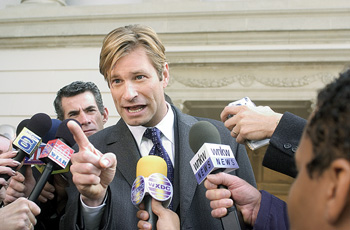![[Metroactive Movies]](/gifs/movies468.gif)
[ Movies Index | Show Times | Santa Cruz | Metroactive Home | Archives ]
The New Insincerity
'Thank You for Smoking' is sharp and funny--but why does no one want to admit it's politically correct?
By Steve Palopoli
Rarely has the problem with satire been nailed better than on The Simpsons, with its immortal portrait of two slacker kids at a music festival:
"Ooh ... he's cool."
"Are you being sarcastic, dude?"
"I don't even know anymore!"
Neither does Hollywood, which lately is working way too hard to avoid any appearances of sincerity or morality that might make its product seem "uncool." It's not that filmmakers are any less sincere or self-righteous, it's just that cynical humor is the current fad for trying to put over your sincere self-righteousness. It's as if you're supposed to trick the audience into agreeing with you. It also helps if you make it seem like you have equal contempt for all points of view on any issue, and for the love of God, don't let on that your universe has a real moral center.
In other words, insincerity is the new sincerity.
The funny thing is, the current cultural obsession with trying to prove you're an "equal opportunity offender" is fooling nobody. Lord of War didn't particularly benefit from straining to pretend its arms-dealer protagonist might be a hip anti-hero. Audiences understood immediately that the film was meant as a scathing attack on the arms-dealing industry, but the filmmakers themselves never seemed comfortable with admitting it, preferring to keep up a little tap-dance that they were doing a black-humor "character study."
Same deal with Thank You for Smoking, which goes to even further lengths to try to obscure its perspective. Does it work? Of course not. No matter how much the hype machine might hard-sell the idea that the movie "skewers both sides of the issue," any child old enough to recognize Joe Camel can tell that underneath the sarcastic joking, this is a bitterly anti-smoking film.
The '90s bestseller by Christopher Buckley on which the film is based would seem to be perfect material for these desperately anti-PC times. Smug and nasty, the book attacks the anti-smoking lobby with venom, for supposedly being morons and the enemies of personal freedom. At the same time, the book also hates on the tobacco industry, not so much for making cigarettes, but for hiding their health risks.
In the film, director-adapter Jason Reitman has reduced the novel to basically a more comic remake of Lord of War, about cigarettes instead of guns. That's not exactly a criticism--this is the funniest movie of the year thus far, and Aaron Eckhart is slimy near-perfection as tobacco lobbyist Nick Naylor, who tells his own story with a blunt ghoulishness that he believes makes what he's doing OK.
What fascinates me about a movie whose tag line is "The world is living in spin" is the loopy spin that this movie examines "all sides of the debate," which implies that, for some reason, it must, if it's to be taken seriously. In fact, it doesn't; the supposed case against the anti-smoking lobby has been reduced mostly to some limp jokes at the expense of William H. Macy's senator character, who is fervently against the tobacco lobby. In the film, Macy's character is a hero--a flawed one maybe, but a hero all the same. And here's another prime example of the difference: in both the book and the film, Nick thinks it's OK to push a product that kills people as long as you're upfront about it. In the book, that is considered to be true. In the film, no way.
Thank You For Smoking veers between in-your-face intensity and a zany tone, as if it's not sure how realistic it should make a character who makes deadpan jokes about killing hundreds of thousands of people. But Jason Reitman shows even better comic timing than his famous father, Ivan, channeling a screwball style from Hollywood's Golden Age and then turning gritty for moments that give the film some depth.
Certainly Eckhart is used to this kind of material, having made his mark in Neil LaBute's In the Company of Men. He's able to sound serious about battling "Cancer Boy" on a talk show, and to let just the tiniest bit of doubt creep across his face at key moments. His performance is the freakiest thing in this film and also the most effective thing here.
So Thank You for Smoking is the best of this latest round of cynical comedies. But one more word of warning: when Dan Whitney's racist and homophobic "Larry the Cable Guy" character is being spun as "satire," you know things are truly out of control.
[ Santa Cruz | Metroactive Central | Archives ]
Copyright © 2006 Metro Publishing Inc. Maintained by Boulevards New Media.
For more information about Santa Cruz, visit santacruz.com.
![]()

Keep Your Chin Up: It's not always easy for Aaron Eckhart, especially in this role as a tobacco lobbyist.
Thank You for Smoking (R; 92 min.), directed and written by Jason Reitman, based on the novel by Christopher Buckley, photographed by Jim Whitaker and starring Aaron Eckhart, opens Friday in Santa Cruz.
From the March 29-April 5, 2006 issue of Metro Santa Cruz.